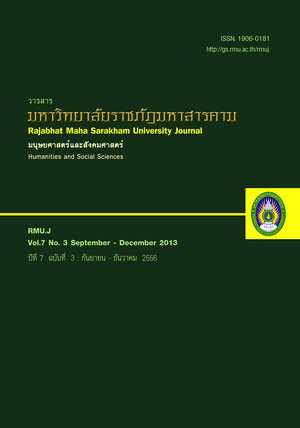ปัจจัยเชิงสาเหตุของพฤติกรรมสุขภาพของผู้สูงอายุในเขตภูมิภาคตะวันตกของประเทศไทย
Main Article Content
บทคัดย่อ
บทคัดย่อ
การวิจัยครั้งนี้มีวัตถุประสงค์ ประการแรก เพื่อศึกษาพฤติกรรมสุขภาพของผู้สูงอายุในเขตภูมิภาคตะวันตกของประเทศไทย ประการที่สอง เปรียบเทียบความแตกต่างของพฤติกรรมสุขภาพของผู้สูงอายุในเขตภูมิภาคตะวันตกของประเทศไทย จำแนกตามปัจจัยส่วนบุคคล ประการที่สาม ศึกษาปัจจัยเชิงสาเหตุของพฤติกรรมสุขภาพของผู้สูงอายุในเขตภูมิภาคตะวันตกของประเทศไทยและ ประการที่สี่ หาแนวทางในการพัฒนาพฤติกรรมสุขภาพของผู้สูงอายุในเขตภูมิภาคตะวันตกของประเทศไทย กลุ่มตัวอย่างคือ ผู้สูงอายุใน เขตภูมิภาคตะวันตกของประเทศไทย จำนวน 400 คนได้มาด้วยการสุ่มตัวอย่างแบบหลายขั้นตอน (Multistage random sampling) เครื่องมือที่ใช้เป็นแบบสอบถามที่ผู้วิจัยสร้างขึ้น สถิติที่ใช้ได้แก่ ความถี่ ค่าร้อยละ ค่าเฉลี่ย ส่วนเบี่ยงเบนมาตรฐาน การทดสอบค่าที (t - test Independent samples) การวิเคราะห์ความแปรปรวนทางเดียว (One-way ANOVA) การวิเคราะห์องค์ประกอบเชิงสำรวจ (Exploratory factor analysis) และการวิเคราะห์แบบจำลองปัจจัยเชิงสาเหตุ ผลการวิจัยพบว่า
1. พฤติกรรมสุขภาพ ความรู้การดูแลสุขภาพ ความเชื่อด้านสุขภาพ ความเชื่อประสิทธิภาพแห่งตน อยู่ในระดับปานกลาง การ ร่วมกิจกรรมทางสังคม ความเชื่อวัฒนธรรมท้องถิ่น การเข้าถึงแหล่งเรียนรู้ และการชี้นำตนเอง อยู่ในระดับต่ำ ส่วนแรงสนับสนุนทาง สังคมอยู่ในระดับสูง
2. พฤติกรรมสุขภาพของผู้สูงอายุในเขตภูมิภาคตะวันตกของประเทศไทย เมื่อจำแนกตามเพศ สถานภาพสมรส ระดับการ ศึกษา รายได้ต่อเดือน สภาพการดูแลผู้สูงอายุ และบทบาทในชุมชนมีความแตกต่างกันอย่างมีนัยสำคัญทางสถิติที่ระดับ .05
3. แบบจำลองปัจจัยเชิงสาเหตุของพฤติกรรมสุขภาพของผู้สูงอายุในเขตภูมิภาคตะวันตกของประเทศไทย มีความสอดคล้อง กลมกลืนกับข้อมูลการวิจัย โดยปัจจัยที่ส่งผลทางบวกและมีนัยสำคัญทางสถิติต่อพฤติกรรมสุขภาพของผู้สูงอายุ ได้แก่ การชี้นำตนเอง ความเชื่อด้านสุขภาพ แรงสนับสนุนทางสังคม การเข้าถึงแหล่งเรียนรู้ และความเชื่อประสิทธิภาพแห่งตนส่วนปัจจัยที่ส่งผลทางลบและ มีนัยสำคัญทางสถิติต่อพฤติกรรมสุขภาพของผู้สูงอายุ ได้แก่ ความเชื่อวัฒนธรรมท้องถิ่น และความรู้การดูแลสุขภาพ
คำสำคัญ : พฤติกรรมสุขภาพ, ผู้สูงอายุ
ABSTRACT
The objectives of this research were: 1) to study the health behavior of elderly, 2) to compare the health behavior of elderly classified by personal factors, 3) to study the causal factors of the health behavior of elderly and 4) to find out the guidelines for health behavior development of elderly in western region of Thailand. The subjects were 400 elderly in western region of Thailand, selected through multistage random sampling technique. The instruments used in this research were a range of questionnaire constructed by the researcher. The statistics used for analyzing data were frequency, percentage (%), mean ( ), standard deviation (S.D.), t-test, and One-way ANOVA. The exploratory factor analysis and casual factors model analysis were analyzed by LISREL version 8.72 program.
The results of the research were as follows:
1. Health behavior, health care literacy, health beliefs, and self-efficacy were rated at a moderate level. Participation in social activities, local cultural beliefs, learning resource access and self-directed learning was rated at a low level whereas social support was rated at a high level.
2. Health behavior of elderly in western region of Thailand classified by gender, marital status, educational background, income per month, elderly caring status and community roles were significantly different at .05 level.
3. Causal factors model of health behavior of elderly in western region of Thailand was accordance with research data. The factors which had positive effect towards health behavior of elderly were self-directed learning, health beliefs, social support, learning resource access and self-efficacy whilst, factors which had negative effect were local cultural beliefs and health care literacy.
Keywords : Health Behavior Elderly
Article Details
1. บทความที่ลงตีพิมพ์ทุกเรื่องได้รับการตรวจทางวิชาการโดยผู้ประเมินอิสระ ผู้ทรงคุณวุฒิ (Peer Review) สาขาที่เกี่ยวข้อง อย่างน้อย 3 ท่าน ในรูปแบบ Double blind review
2. ข้อคิดเห็นใด ๆ ของบทความที่ลงตีพิมพ์ในวารสารมหาวิทยาลัยราชภัฏมหาสารคาม นี้เป็นของผู้เขียน คณะผู้จัดทำวารสารไม่จำเป็นต้องเห็นด้วย
3. กองบรรณาธิการวารสารมหาวิทยาลัยราชภัฏมหาสารคาม ไม่สงวนสิทธิ์การคัดลอกแต่ให้อ้างอิงแสดงที่มา


